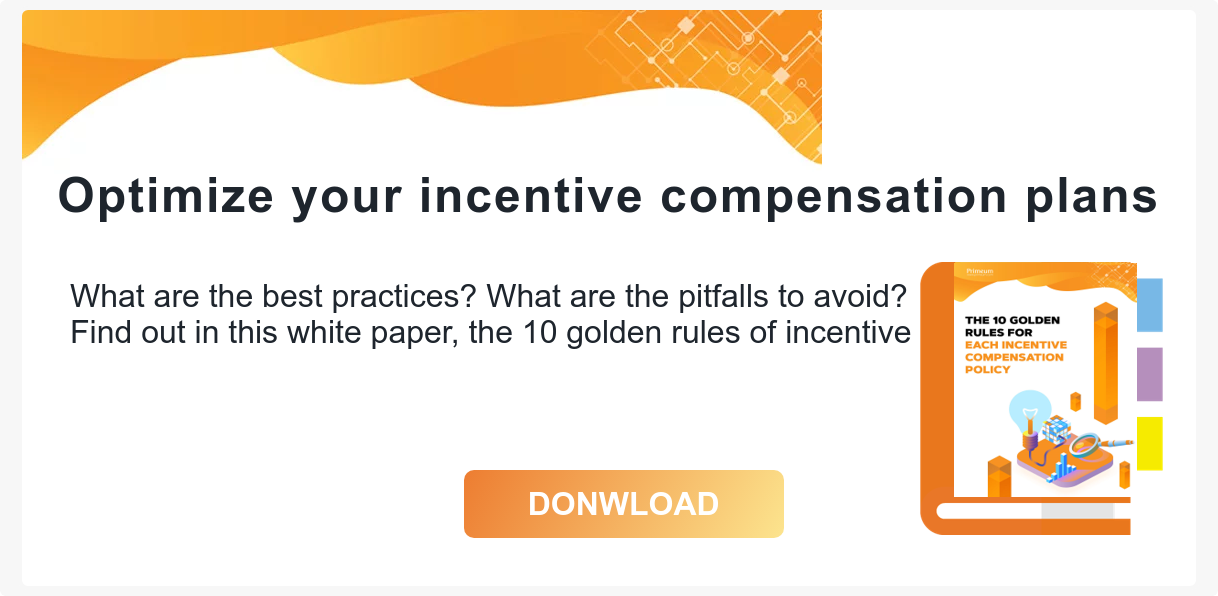The Covid-19 crisis is taking hold over time and the morale of some salespeople is flagging. Faced with falling turnovers, isolation due to remote working, lack of contact with teams, and even a loss of meaning, sales staff, depending on their personality, are handling fairly well this unprecedented pandemic period which is directly affecting their professional lives. Variable remuneration is a driving force to combat the drop in morale of sales teams – professionals driven by performance and by the possibility of significant gains. However, if poorly calibrated, it can be a real source of demotivation.How can incentive compensation be used to boost sales teams’ morale? We look at some of the answers in this article.
Low morale comes with the job for a salesperson
Decreased motivation is inevitable in the life of a sales representative. During normal periods, they may experience a dip in motivation at certain times of the year. It is relatively rare for a salesperson’s performance to be exactly the same throughout the year, and the same applies to their level of motivation. Nevertheless, when the troops’ morale drops significantly over a long period of time and it becomes difficult to ride out the wave: it is time to act.
It’s not enough to just follow the results of a salesperson: you have to look at their personality
The right managerial approach involves monitoring the salesperson’s activity, taking into account personality factors. The salesperson’s morale has a direct impact on their motivation and performance. When morale is high, the salesperson is optimistic about reaching their targets and will be more inclined to achieve strong performance. Their productivity is therefore closely linked to their state of mind, but also to the quality of the relationships they establish with their manager and the rest of the team. The stronger their relationship with their manager and other team members, the easier it will be to navigate rough patches and return to increased productivity.
How do you spot a drop in morale among your teams?
Negativity, absenteeism, increased sick leave, particularly during this home working period, reduced commitment and decreased interaction with teams are some of the many signs of a drop in morale. Lack of initiative also indicates the salesperson is no longer engaged with their environment, or even their job. The fall in morale thus leads to a drop in motivation and commitment, which encourages resignations and employee turnover.
The key role of managers in maintaining motivation
In face-to-face as well as remote working, managers have an important role to play with employees, especially if the latter are lacking motivation. First of all, it is important to monitor performance indicators regularly and objectively. This is an essential condition to note any “disengaged” salespersons. However, while the reporting needs to be accurate and regular, it must not generate additional stress for the salesperson. While precise monitoring of achievements can indicate a slowdown in sales activity and allow managers to act quickly, the employee must receive close and personalised support.
More discussion time to combat reduced morale
The individual support for each sales representative is a lever for identifying and, above all, for combatting disengagement and reduced motivation. Holding multiple discussions during weekly meetings enables managers to support sales representatives in their work and to identify sticking points more easily. In addition, it is also an opportunity to highlight the value of the work carried out and to show a certain level of recognition to sales representatives. In addition to pointing out areas for improvement, regular manager/salesperson meetings will help strengthen the relationship. The discussions thus make it possible to humanise the relationship but also to detect demotivation more quickly from the first signs. It should be noted that these meetings have become particularly important since the development of remote working.
Incentive compensation: a lever to combat low morale?
Without adjusting incentive compensation targets, sales staff can quickly become discouraged and feel it is impossible to achieve their usual performance. The health crisis related to the Covid-19 pandemic has had a direct impact on the economy, including business activity. With shops closed in lockdown and a general drop in sales in most sectors of activity etc, employees are bound to be affected and it now seems variable remuneration schemes will have to be adapted. Sales forces – employee groups which are directly affected by the fall in sales – are thus seeing their targets revised and rethought.
To prevent incentive compensation demoralising sales staff, targets – both national and sectoral – need to be revised.
HOW DO YOU REVISE THE NATIONAL TARGET?
The budget approach
The budget approach is based on the distribution of the bonus envelope that the company can distribute in a period when it is economically weakened.
Depending on the performance period, reflection on the budget envelope can materialise in two different ways:
-for a short cycle, once the bonus envelope has been decided, it is possible to deduce the national revision of objectives enabling the exact distribution of this envelope.
-for an annual cycle, the envelope is projected on the basis of the performance observed after lockdown. This projection will make it possible to define the revision of the annual target. However, the envelope distributed at the end of the year will also depend on the performance in the second half of the year.
The performance approach
The performance approach consists of thinking about how to limit the effect of the lockdown period on individual and collective performance. In this context, the approach to limiting external effects on performance involves properly defining a revised national revision of objectives that will be between:
-The actual revision of objectives observed at the end of lockdown;
-The actual revision of objectives observed before lockdown; and
-A 100% neutralised revision of objectives.
The company will subsequently have to ensure that the envelope distributed with this revised national revision of objectives complies with the various existing budgetary constraints.
HOW DO YOU REVISE SECTORAL TARGETS?
Sales staff have been moderately affected by lockdown. Consistency needs to be maintained between the revision of the national target and that of sectoral targets. Indeed, since the commercial sector has been impacted in a relatively uniform manner, sectoral objectives must be revised in exactly the same way as the national target. As such, if the operational reality imposed by the context leads to a national revision of objectives reduced by 9%, then the performance expected from each employee must also be reduced by 9%.
If sales staff have been affected differently by lockdown and, more generally, by the context of the health crisis, then a distinction must be made between individual situations. Indeed, as each sales representative is affected differently, local management needs to be heavily involved in the process of revising individual targets to continue to ensure that targets are fair for everyone.
Supporting managers in the process of revising the individual targets of their employees requires the implementation of precise rules to assist in the decision-making process so that they can make fair adjustments. In addition, a process for approving the targets revised by managers will need to be defined.





